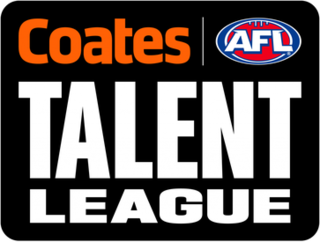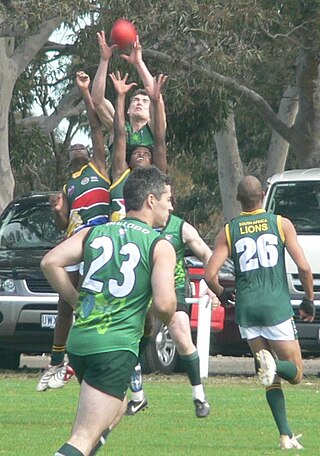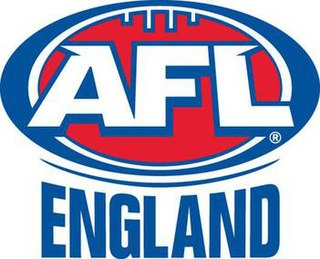
Association football is the most popular sport in Russia, surpassing ice hockey by a wide margin. Men's football is overseen by the Russian Football Union, having the Russian Premier League as the first tier of the Russian football league system, with the Russian Football National League being the second tier.
The Australian Football International Cup was an triennial international tournament in Australian rules football. It was the biggest international tournament in the sport that is open to all nations. More than 26 nations have participated and the competition has expanded into multiple pools and both men and women's divisions. At the time of the last tournament in 2017, the sport had a record 170,744 registered players outside Australia growing at a rate of 25 per cent per annum.

The Great Britain men's national Australian rules football team is known as the Great Britain Bulldogs. The team is made up of the best British born players selected from clubs of in England, Wales and Scotland, and occasional appearances from British players playing for clubs in Australia. In AFL Europe, separate national teams represent England, Wales and Scotland.

The Irish national Australian rules football team represent Ireland in Australian rules football and is selected from the best Irish born and raised players primarily from the clubs of the Australian Rules Football League of Ireland but also playing abroad.

The Talent League is an under-19 Australian rules football representative competition based in Melbourne and run by the Australian Football League (AFL). It is based on geographic regions throughout country Victoria and metropolitan Melbourne with each team representing one of twelve Victorian regions, while a thirteenth team from Tasmania was reintroduced in 2019.

The Republic of Ireland women's national football team represents the Republic of Ireland in competitions such as the FIFA Women's World Cup and the UEFA Women's Championship. The team played in their first World Cup at the 2023 FIFA Women's World Cup. It has taken part in invitational tournaments such as the Algarve Cup, the Istria Cup, the Cyprus Cup and Pinatar Cup. It is organised by the Women's Football Association of Ireland.

Women's Australian rules football, is the female-only form of Australian rules football, generally with some modification to the laws of the game. It is played by more than half a million women worldwide and with 119,447 Australian adult and 66,998 youth female participants in 2023 is the second most played code among women and girls in Australia behind soccer.
The Euro Cup is an international Australian rules football tournament played between European national teams. Played under nine-a-side footy rules, the tournament was first held at Chiswick in London, England in 2005, created by Australian Football International. A women's cup has been played between more than two teams since the 2014 tournament.

In Ireland, Australian rules football began in 1999 when clubs were simultaneously formed in Dublin and Belfast, however awareness of it dates back to the 20th century due to similarities with Gaelic football and hyrbid matches played between Irish and Australian teams. It has subsequently becoming a source of players for professional leagues in Australia, particularly the Australian Football League (AFL) and later the AFL Women's (AFLW) through the Irish Experiment which is ongoing. It attracts a television audience, particularly the AFLW competition through TG4. There are two governing bodies, AFL Ireland and AFL Northern Ireland, with teams and competitions in Belfast, Cork, Dublin, Galway and Killarney. The game in Ireland is typically played in a modified 9-a-side footy format on rectangular fields.

The 2008 Australian Football International Cup was the third time the Australian Football International Cup, an international Australian rules football competition, has been contested.
In Scotland, the sport of Australian rules football is a minor, relatively unknown sport, currently played at amateur level by men and women teams from five clubs spread across the regions of Glasgow, Edinburgh, Fife and West Lothian. The Haggis Cup, a major invitational tournament hosted in Scotland, has been run annually since 2004. Unlike the sport in England, in Scotland, the main format is nine-a-side footy played on rugby union fields.

Australian rules football is played in Europe at an amateur level in a large number of countries. The oldest and largest leagues are those in the United Kingdom, Ireland and Denmark, in each of these nations there are several established clubs, and organised men's, women's and juniors programs. The British AFL has now expanded into Welsh, Scottish and English leagues. The Danish AFL has been responsible for the expansion of Australian Football into Sweden, Finland, Iceland and Norway. The governing body for Australian Football in Europe was founded in Frankfurt in January 2010; the body was initially called the European Australian Football Association, but changed its name to AFL Europe at a general assembly meeting in Milan in October of the same year. It currently has 22 member nations. AFL Europe, with backing of the AFL in Australia has overseen a large improvement in the organisation of Australian football in Europe.
Australian rules football in the Middle East describes the minority sport of Australian rules football as it is watched and played in the Middle East region.
The AFL National Championships is an annual Australian national underage representative Australian rules football tournament. Since taking over as national governing body in 1995, the AFL has gradually restructured the competition into a primary junior pathway for its fully professional national club competition.
Huddersfield Rams is an Australian rules football team, based in the West Yorkshire town of Huddersfield, England. They were formed in November 2008 by Karl Haigh, who was introduced to the sport when travelling in Australia.
The Georgia women's national football team represents Georgia in international football. Georgia took part in the world cup qualification group 7 for the 1999 FIFA Women's World Cup, but withdrew after two matches, against Yugoslavia (0–11) and Turkey (0–1). After this, Georgia did not take part in qualification until the European Championships in 2009. Then, Georgia were placed in a group with Turkey, Northern Ireland and Croatia. Georgia finished last, with no points.
AFL Europe is the regional governing body for Australian rules football in Europe. As of 2018, it organises the AFL Europe Championship and the Euro Cup, and previously managed the European Legion representative team as well being responsible for the organisation of the ANZAC Cup, Fitzpatrick Cup and AFL Europe Champions League.

AFL England is the governing body for Australian Rules Football in England. It was formed in 2012 to succeed AFL Britain with the aim to be more effective in governing the game in England, as both Scotland and Wales had developed their own autonomous bodies.

Cora Staunton is an Irish sportswoman. She is best known as a ladies' Gaelic footballer, winning four All-Irelands and three Ladies' National Football League titles with Mayo. She has also been an All Star on eleven occasions. In addition to playing Gaelic football, Staunton has also played three other football codes at a senior level. In 2006, as an association footballer, she won an FAI Women's Cup winner's medal with the Mayo Ladies' League representative team. In 2013, she began playing rugby union for Castlebar Ladies in the Connacht Women's League. In she 2018 made her Australian rules football debut in the AFLW competition for the Greater Western Sydney Giants, establishing herself by 2022 as one of the league's all-time great goalkickers. She has also played for the Ireland women's international rules football team. Staunton works as a HSE liaison officer, working with women from the Irish Travellers community.
The NAB AFL Women's Under-18 Championships are the annual national Australian rules football championships for women players aged 18 years or younger. The competition is seen as one of the main pathways towards being drafted into a team in the professional AFL Women's competition (AFLW). Originally known as the AFL Youth Girls National Championship, the competition has teams of players representing their states and territories in a round robin tournament. The tournament is currently sponsored by the National Australia Bank. The winner of the 2019 tournament was Vic Metro.










